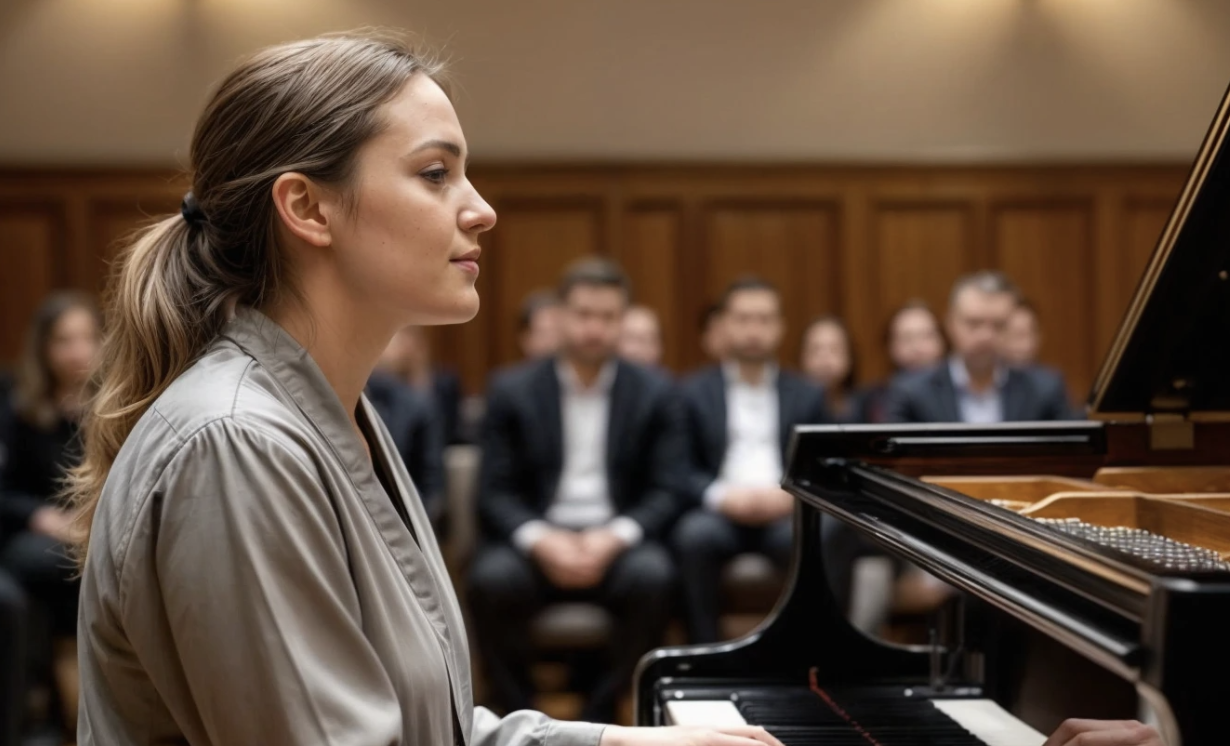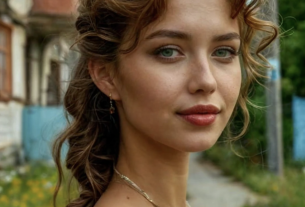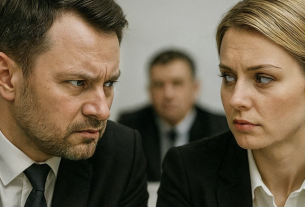I had always believed that life is not a straight road, but rather a winding path full of unexpected turns. Sometimes it leads you to a sunny clearing, and sometimes into a dense, impenetrable forest. My path led me to a small, cozy café called Melody, where I worked, keeping everything clean and in order.
My name is Sofia. And this job, though far from prestigious, was a real salvation for me. It allowed me to stay close to the dearest person in my life — my grandmother, Anna Petrovna. She was already past eighty, the years and all the hardships she had endured were taking their toll; it was difficult for her to move around, and leaving her alone for long was simply impossible. Every time I left the house, I would silently repeat to myself that everything would be fine, that I would be back soon.
Seven years ago, our life had been filled with completely different sounds. Not the squeak of a mop and the hum of the dishwasher, but the velvety, shimmering tones of the piano. I was studying music; my whole life revolved around the black-and-white keys. I remember my first solo concert. I was eighteen, the hall was packed, and after the final chord there was a moment of silence — then a thunder of applause. My parents looked at me with shining eyes; their pride was my greatest reward. We made plans, dreamed of the conservatory, of a big stage, of a future that seemed bright and cloudless.
But fate decided otherwise. That evening, on our way home after the concert, our car found itself in the path of a huge truck. My parents were gone in an instant. I survived, but spent a long three months in the hospital. My leg healed incorrectly, and from then on my gait was uneven, reminding me of that night every single minute. And my grandmother, Anna Petrovna, when she heard what had happened, suffered a stroke, after which her legs almost stopped obeying her. In a single moment, she and I were left alone, and our world turned upside down.
Our savings melted away before our eyes. First we had to part with my grandmother’s jewelry, the keepsakes of her youth. Then it was the turn of the most precious thing of all — my grand piano. It wasn’t just an instrument; it was a member of the family, an antique mahogany piano with a deep, velvety sound. My parents had saved for years to buy it. When they took it away, I sat in the empty room and listened to the ringing silence in my ears. It felt as if part of my soul was leaving with it. But we had to go on living, I had to take care of my grandmother, buy medicine, simply buy food.
With my education cut short halfway and my uneven gait, finding a job was next to impossible. I needed flexible hours so I could look after Anna Petrovna. And then, six months ago, I learned that a new café, Melody, was looking for someone to keep the place clean. I mustered all my courage and went there.
The owner, Artem Viktorovich, a stern-looking man, listened to me attentively.
— Do you have trouble with discipline?
— No, — I answered quietly.
— Things don’t disappear from customers’ tables?
— Never.
— Are you ready to work conscientiously?
— Yes, of course.
— Then start tomorrow.
The pay was modest, but it came on time. The staff was mostly nice; the girls — Svetlana, Marina, and Alla — treated me with understanding. Only one person, the assistant manager named Vladislav, seemed to take special pleasure in pointing out my smallest mistakes.
— Sofia, there’s a streak from the water here!
— Sofia, you missed that corner!
I would silently nod and redo everything. This job was far too important to waste energy on such things.
In the center of the café hall stood a magnificent black grand piano. It was there to create a special atmosphere. Every time I wiped its polished surface, I felt goosebumps run down my spine. My hands itched to touch the keys, but I held myself back. This was not my place. My place was with a rag and a bucket.
Once, about a month ago, a well-known local businessman, Mr. Orlov, booked the hall for his birthday party. A solid, influential man. We prepared for the event with particular care. Artem Viktorovich personally inspected every corner, and the waitresses rearranged the cutlery with jeweler’s precision.
And then, an hour before the start, the manager, a young man named Dmitry, burst into the storage room, his face white as chalk.
— Disaster! The musician we hired got sick! What are we going to do now?
Vladislav, standing next to him, only smirked maliciously.
— That’s not part of my responsibilities. I’m in charge of the service staff, not the creative types.
Dmitry was on the verge of despair.
— Orlov specifically asked about live music! He saw our piano! If there’s no performer, Artem Viktorovich will fire me!
I listened to this conversation, standing in the doorway with a wet rag in my hands. And suddenly, from somewhere deep inside, a crazy thought surfaced. My knees were shaking with fear. It had been seven years since I’d touched an instrument. But my fingers were clenching of their own accord, remembering the old movements.
— Dmitry, — I whispered so quietly that at first I wasn’t even sure I’d said it out loud. — Maybe I could try?
He turned sharply, his eyes full of bewilderment.
— You? Play the piano?
— A long time ago I studied.
Vladislav burst out laughing.
— Well, would you look at that! Our modest little backstage worker! A real Cinderella transformation!
But Dmitry, seeing how serious I was, clutched at this last straw.
— How confident are you? You do realize that if you mess up…
— It can’t be worse than no music at all, — I replied honestly.
I asked them to turn off the lights in the hall while I went to the piano. I was embarrassed by my uneven gait and my simple work clothes. But when the lights came back on and my fingers touched the cold keys, something clicked inside me.
A Chopin waltz poured out all by itself. I closed my eyes and was carried away to another time, another place. There was no pain, no loss, no hard work. There was only music. Pure, bright, soaring like the first morning of spring. It filled the entire space, touched every heart in the hall.
When the last notes faded into silence, I opened my eyes. The hall exploded in applause. People were rising from their seats, their faces lit up with smiles; someone was wiping the corners of their eyes. I hadn’t seen such genuine admiration even at my most successful performance.
Mr. Orlov approached me, his gaze serious and intent.
— May I ask your name?
— Sofia… Sofia Leonidovna.
— Anatoly Orlov. Tell me, have you had professional training?
I briefly, skipping over the most painful details, told him about my studies in the past. He listened without interrupting, nodding from time to time.
— What a pity, — he said thoughtfully. — A great pity. A gift like yours should not gather dust in oblivion.
After all the guests had left, Dmitry came up to me, his face radiant.
— Sofia, listen. Starting tomorrow you’re our staff musician. The salary is double, you’ll play from six to eleven in the evening. Will that work for you?
I felt warm drops running down my cheeks, but this time they were not tears of despair — they were tears of relief and quiet joy. Evenings at the instrument and days at home with my grandmother — it was exactly what I had barely dared to dream of.
Vladislav’s lips twisted into something resembling a smile.
— Well then, congratulations. You’re our star now.
There was barely concealed irritation in his voice — after all, my position at the café had just become much higher than his.
A week of my evening performances went by. The hall was almost full, guests chatted quietly over dinner, and I played something light and unobtrusive. And then I saw Mr. Orlov walk in, accompanied by another man. He came up to the piano and motioned for me to pause.
— Sofia Leonidovna, may I have a minute of your time?
We stepped aside. He handed me a business card.
— This is my old friend, Sergei Fedorovich. A very talented doctor. I told him your story, and he has offered to help. It’s possible that something can still be done for your leg.
My heart began to beat so fast that there was a ringing in my ears.
— But I… I can’t afford such treatment…
— Who said anything about payment? — he gently interrupted. — Talent is a treasure. It must be protected, not left to gather dust.
A month later I had the operation. The limp in my gait almost disappeared — only a barely noticeable peculiarity remained, which I soon stopped noticing at all.
And another month after that something happened that I still could hardly believe. Dmitry came up to me during a break, his eyes gleaming mischievously.
— Sof, someone’s here for you. They’re waiting in the hall.
I walked out and froze in place. In the middle of the hall stood two movers, and next to them… my piano. The very same one, mahogany, with the small scratch on the left leg that I had made as a child.
— How? — was the only word I could manage.
The older mover handed me an envelope.
— Mr. Orlov sent a new instrument to your establishment. And he told us to return this one to its rightful owner. He said that every thing must return to its own home.
I stood there, unable to contain the wave of emotion inside me. Later, my grandmother Anna Petrovna would say that for several days I walked around like a sleepwalker, constantly going up to the piano and touching it, as if checking whether it was real or just a mirage.
Dmitry, too, was deeply moved. Over the months we had grown very close. He had gone through a terrible loss — his wife had died after a long illness, and he was left alone. We understood each other almost without words; it was comfortable for us to share the silence.
Another six months passed, and one evening, after my performance, Dmitry said simply and sincerely:
— Sofia, let’s live together. I’m lonely in an empty apartment, and you need help with Anna Petrovna.
I agreed. Not out of calculation or gratitude. I realized that I had grown truly attached with all my heart to this kind, reliable, and understanding man. And he treated my grandmother with such tenderness and care, as if she were his own.
We celebrated our wedding in that very same café, Melody. Artem Viktorovich gave us the hall, and the girls from the staff helped us organize a modest but very heartfelt celebration. Even Vladislav came with a gift, though he looked a bit embarrassed about it.
Mr. Orlov came as well, to congratulate us in person.
— You see how life sometimes works out? — he said with a smile. — Nothing happens for nothing. A true gift will always find a way to the sunlight, even from the deepest shadow.
Now, every evening, I sit down at my piano — the very same one that returned to me like a message from a past, happy life. But I don’t look back with sadness. I look forward, because I see the shining eyes of my grandmother, Anna Petrovna, who seems to have grown younger from happiness. I feel the firm, steady hand of my husband, Dmitry, on my shoulder. I hear the soft, approving applause of the café guests who come not only to eat, but also to listen to the music that is born here and now.
Sometimes I think that the straight, bright road I once imagined for myself may not have been the only true one. My winding path, with all its bumps and turns, has led me exactly where I needed to be — to what truly matters. To love, to family, to a home where I am awaited. And my music has only grown deeper, wiser, and more piercing because of it. It has ceased to be just a set of notes and has become the true melody of my destiny — a melody that holds a touch of gentle sadness, endless gratitude, and a quiet, radiant joy that grows louder and louder with each new day



